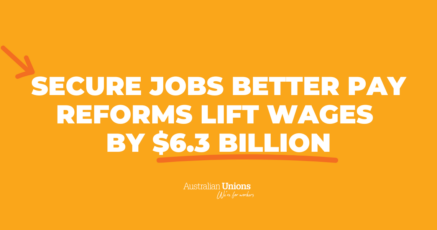Having children can be a pretty monumental time in people’s lives. It’s also, naturally, quite stressful – especially for first-time parents or parents of children who experience unexpected complications in the first few months.
Transitioning back to the workplace after the long period of leave is often part of this stress – but there are ways to make this move as smooth as possible. Let’s take a look at what can be done to mitigate the stress of returning to work as a new parent and how can we fix some of the challenges it presents for workers.
What kind of leave are you entitled to as a new parent?
Like so many of the entitlements we take for granted at work today, it’s thanks to years of campaigning by union members that we have access to special paid leave when becoming a parent. We’ve come a long way over the last forty years, but there’s still a way to go.
Just last week, we had a huge win for workers, with the Federal Government announcing that it would expand access to Parental Leave from 1 July 2023. You can read more about the changes here.
For now, workers are entitled to maternity leave, paternity and partner leave and paid parental leave. The eligibility criteria and your entitlements will depend heavily on your individual circumstances and also your workplace or industry and some workplaces may even offer you additional leave entitlements.
While you’re on leave, set clear boundaries and stick by them
What are known as ‘keeping in touch days’ are a great way to still keep in the loop with what’s happening at work. If you’re on unpaid parental leave, you can work generally up to 10 days (with pay, of course).
Alternatively or additionally, while you’re on parental leave, you or your employer may want to set up some regular informal catch-ups. This isn’t necessarily a bad thing – it can be an excellent way to keep up with your colleagues and friends, providing opportunities for preparation that help take the pressure off that dreaded first day back.
But, and you knew there’d be a but, sometimes these catch-ups can come with expectations. A little question here, a little query there, a quick search for this, a short meeting about that. The boundaries begin to blur – all the while looking after a newborn child.
Having a new baby is a full-time job, so don’t be afraid to set some new boundaries with your manager or colleagues if you’re meeting them for a catch-up during your leave. For example, you might say that hearing updates about projects is fine but that asking for your input on them is a no-go.
And if your boss or colleagues aren’t doing that? That’s where your union can help.
Plan your return to work to reduce the first-day jitters
You know the feeling when you’re about to return to work after a few weeks of annual leave? It’s not always so tranquil. Sometimes it can be helpful to prepare a few things, so your return is as easy and dread-free as possible.
If you’ve taken months of parental leave, returning to work can feel like even more of a jolt.
A 2021 report from the Shop, Distributive and Allied Employees Association found that many workers had rocky transitions back to workplaces where there was a lack of support provided.
One mum who returned to a part-time job described how initially she was told there were no available hours. A week later, she was provided three roster options but with nowhere near her entitled work hours.
“Shifts were too late or too early as childcare wouldn’t be open, so was told I miss out on hours then,” she said.
“The transition has been extremely stressful for my family. I definitely thought I would have been more supported in my return to work.”
But there were also some survey responses from workers that showed the benefits of having supportive employers.
“My store was very welcoming and I was made to feel as if I was a part of the team even though I was only doing a total of 22hrs over 3 days,” another part-time working mum said.
Australian workplaces are gradually becoming more family-friendly and, off the back of the pandemic, are forced to be more flexible. New parents can use this to their advantage. Before you go on leave, discuss flexible working arrangements with your boss that suit you and your new family. That could mean starting on three days a week to ease into your return or working from home for at least a couple of days a week.
Getting started with childcare while campaigning for change
Finally, we come to the question of childcare. For many, this is the most daunting part. Many variables will depend on your circumstances, so it’s essential to do your research and think about the kind of care you can access and afford.
The truth is, working parents in Australia have been dealing with one of the most expensive childcare and education systems in the developed world. It’s not good enough, and it’s causing significant stress on new parents returning to work.
We believe that quality, affordable childcare is vital for preserving jobs and rebuilding our economy. That’s why we’re demanding the government to:
- provide permanently free, universal, high-quality childcare
- ensure early childhood educators are securely employed and fairly paid
- invest in the construction of new, high-quality, publicly funded non-profit facilities
- fund universal access to 15 hours of preschool for three- and four-year-olds.
Why? Because it’s the right thing to do for workers. And we already know that it can lift half a million Australians out of poverty. If you believe that providing free childcare is vital for all Australian workers, add your voice to our petition to make childcare free.
Join the movement so we can keep winning for working parents
If you need support and guidance as a new parent returning to the workforce, talk to your union. Being part of a union means there’ll always be someone you can talk to if you’re having a tough time. You don’t have to endure it alone.
Every worker who joins their union contributes to making our movement bigger, stronger and louder – so we can continue campaigning for improvements to Paid Parental Leave for all workers.







SHARE:
Together we can take the stress out of returning to work as a parent